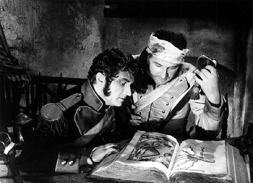 The Saragossa Manuscript, a 1965 film from Poland directed by Wojciech Has, became something of a cult favorite among younger American moviegoers at the time, dovetailing with the psychedelic era of the late 60s. After five decades we can see that it’s more sophisticated than the original fan base might have led us to believe.
The Saragossa Manuscript, a 1965 film from Poland directed by Wojciech Has, became something of a cult favorite among younger American moviegoers at the time, dovetailing with the psychedelic era of the late 60s. After five decades we can see that it’s more sophisticated than the original fan base might have led us to believe.
Attempting to make a film from the huge novel, completed in 1814, by Count Jan Potocki—a work containing over a hundred different tales—was an ambitious undertaking, to put it mildly. Has and his screenwriter Tadeusz Kwiatkowski pared the structure down to about ten major strands, filmed it in beautiful widescreen black & white, and produced a three hour epic with an intermission, a flawed but engaging ode to the picaresque that is truly one of a kind.
In the midst of a battle during Napoleon’s war in Spain, a French officer stumbles upon a manuscript so fascinating that he barely looks up from his reading when Spanish troops burst in to the makeshift headquarters and capture him. A Spanish officer joins him in his reading, discovering that the book’s protagonist was his grandfather, a Belgian captain named Alfons van Worden. We then cut to the story of Alfons (played by the great Zbigniew Cybulski) who gets caught in a kind of supernatural loop as he tries to get to Madrid, is tempted by two Muslim princesses, converses with a distinguished mathematician, and dodges threats from the Inquisition, while suffering from the demonic influence of a couple of hanged men who keep coming back to life. Each character he meets has his or her own story, told in flashback, and as the movie goes on, characters within the stories tell their stories, in which other characters tell theirs, until we have flashbacks within flashbacks within….well, you get the idea.
The director, Has, succeeds in capturing something of the 18th century love of surface, the playfulness of tale-telling mixed with ironic pedantry, familiar from authors such as Fielding or Diderot. If you’re paying attention, you may notice hints regarding the symbolism of the Cabala, a primary aspect of the novel.
In the central role, Cybulski projects a naiveté that is quite charming, and the picture is beautiful to look at—the luscious widescreen compositions by cinematographer Mieczyslaw Jahoda have an almost classical purity. On the downside, the material inherently loses in depth what it attempts in range—it’s simply impossible for the film to achieve all its narrative goals. Yet you could do a lot worse than indulging in this riotous alternate universe for three hours. The Saragossa Manuscript has enough wit, or nerve, to avoid the trap of heaviness—it’s a light spectacle, a mock mini-epic, mysterious, absurd, and a great deal of fun. It’s available on DVD.

This 1923 thrill comedy, climaxing in a famous climb up a skyscraper, shows silent comedian Harold Lloyd at his very best. There are three...

A small town minister suffers a crisis of faith when confronted by one of his parishioners with the question of whether God can forgive...

An indigenous Chilean is forced to accompany two white men massacring native people in Tierra del Fuego to make room for business and settlements....